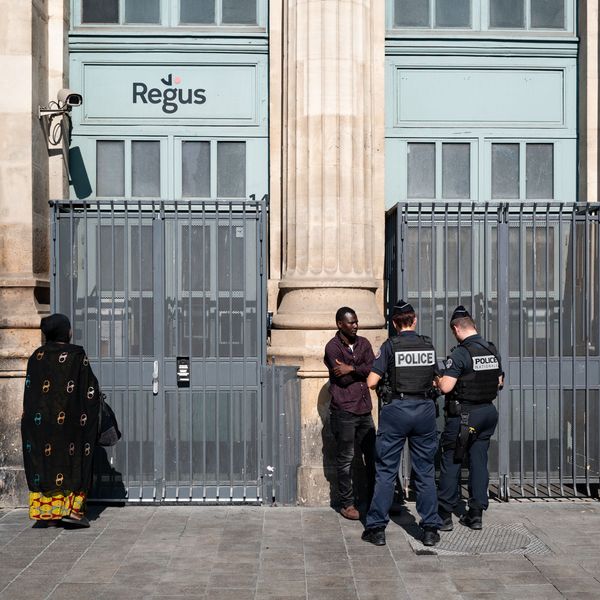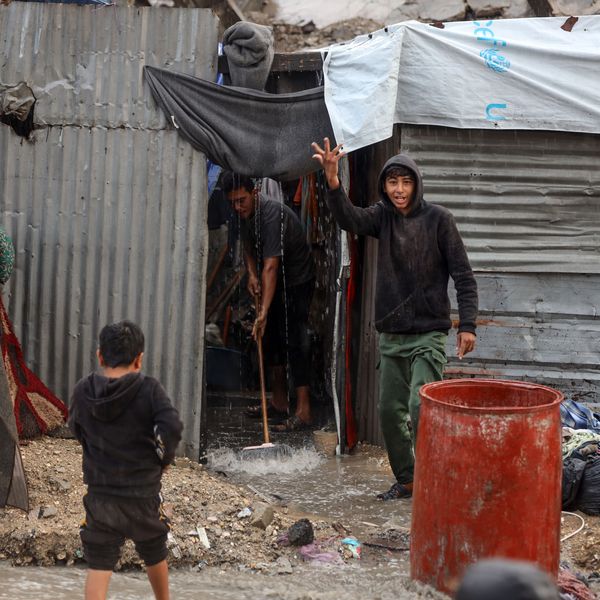EU Leaders Consider New Internment Camps for Rejected Refugees
Document obtained by the Guardian shows EU ambassadors planning 'detention measures' for people whose asylum applications are turned down
Among the topics being discussed by European Union ministers at an emergency session in Brussels is a proposal for the new internment of refugees fleeing war and poverty, the Guardian revealed Monday.
A four-page draft statement prepared by EU ambassadors ahead of Monday's meeting was obtained by journalist Ian Traynor.
The document, which Traynor says is likely to receive backing from EU governments, reportedly states that "reception facilities will be organized so as to temporarily accommodate people" in Greece and Italy during their process of identification, registration, and application for asylum.
Those whose bids are rejected should be rapidly deported, the document states.
Further, in cases where authorities suspect rejected applicants will seek entry into another EU country, they can be interned, the statement declares.
"When voluntary return is not practicable and other measures on return are inadequate to prevent secondary movements, detention measures... should be applied," the document states.
The document directs the EU to fund and build refugee camps for the rejected asylum-seekers in locations outside of Europe and not in their country of origin.
The Brussels meeting comes as the humanitarian response by EU states flounders in the face of the worst refugee crisis since World War II. Over the weekend, Germany--which has championed itself the leader of the humanitarian response--tightened border restrictions, cut off trains traveling from Austria, and escalated random checks on cars.
Meanwhile, people seeking refuge are already being forced into squalid camps across Europe and the Middle East.
An Urgent Message From Our Co-Founder
Dear Common Dreams reader, The U.S. is on a fast track to authoritarianism like nothing I've ever seen. Meanwhile, corporate news outlets are utterly capitulating to Trump, twisting their coverage to avoid drawing his ire while lining up to stuff cash in his pockets. That's why I believe that Common Dreams is doing the best and most consequential reporting that we've ever done. Our small but mighty team is a progressive reporting powerhouse, covering the news every day that the corporate media never will. Our mission has always been simple: To inform. To inspire. And to ignite change for the common good. Now here's the key piece that I want all our readers to understand: None of this would be possible without your financial support. That's not just some fundraising cliche. It's the absolute and literal truth. We don't accept corporate advertising and never will. We don't have a paywall because we don't think people should be blocked from critical news based on their ability to pay. Everything we do is funded by the donations of readers like you. Will you donate now to help power the nonprofit, independent reporting of Common Dreams? Thank you for being a vital member of our community. Together, we can keep independent journalism alive when it’s needed most. - Craig Brown, Co-founder |
Among the topics being discussed by European Union ministers at an emergency session in Brussels is a proposal for the new internment of refugees fleeing war and poverty, the Guardian revealed Monday.
A four-page draft statement prepared by EU ambassadors ahead of Monday's meeting was obtained by journalist Ian Traynor.
The document, which Traynor says is likely to receive backing from EU governments, reportedly states that "reception facilities will be organized so as to temporarily accommodate people" in Greece and Italy during their process of identification, registration, and application for asylum.
Those whose bids are rejected should be rapidly deported, the document states.
Further, in cases where authorities suspect rejected applicants will seek entry into another EU country, they can be interned, the statement declares.
"When voluntary return is not practicable and other measures on return are inadequate to prevent secondary movements, detention measures... should be applied," the document states.
The document directs the EU to fund and build refugee camps for the rejected asylum-seekers in locations outside of Europe and not in their country of origin.
The Brussels meeting comes as the humanitarian response by EU states flounders in the face of the worst refugee crisis since World War II. Over the weekend, Germany--which has championed itself the leader of the humanitarian response--tightened border restrictions, cut off trains traveling from Austria, and escalated random checks on cars.
Meanwhile, people seeking refuge are already being forced into squalid camps across Europe and the Middle East.
Among the topics being discussed by European Union ministers at an emergency session in Brussels is a proposal for the new internment of refugees fleeing war and poverty, the Guardian revealed Monday.
A four-page draft statement prepared by EU ambassadors ahead of Monday's meeting was obtained by journalist Ian Traynor.
The document, which Traynor says is likely to receive backing from EU governments, reportedly states that "reception facilities will be organized so as to temporarily accommodate people" in Greece and Italy during their process of identification, registration, and application for asylum.
Those whose bids are rejected should be rapidly deported, the document states.
Further, in cases where authorities suspect rejected applicants will seek entry into another EU country, they can be interned, the statement declares.
"When voluntary return is not practicable and other measures on return are inadequate to prevent secondary movements, detention measures... should be applied," the document states.
The document directs the EU to fund and build refugee camps for the rejected asylum-seekers in locations outside of Europe and not in their country of origin.
The Brussels meeting comes as the humanitarian response by EU states flounders in the face of the worst refugee crisis since World War II. Over the weekend, Germany--which has championed itself the leader of the humanitarian response--tightened border restrictions, cut off trains traveling from Austria, and escalated random checks on cars.
Meanwhile, people seeking refuge are already being forced into squalid camps across Europe and the Middle East.

